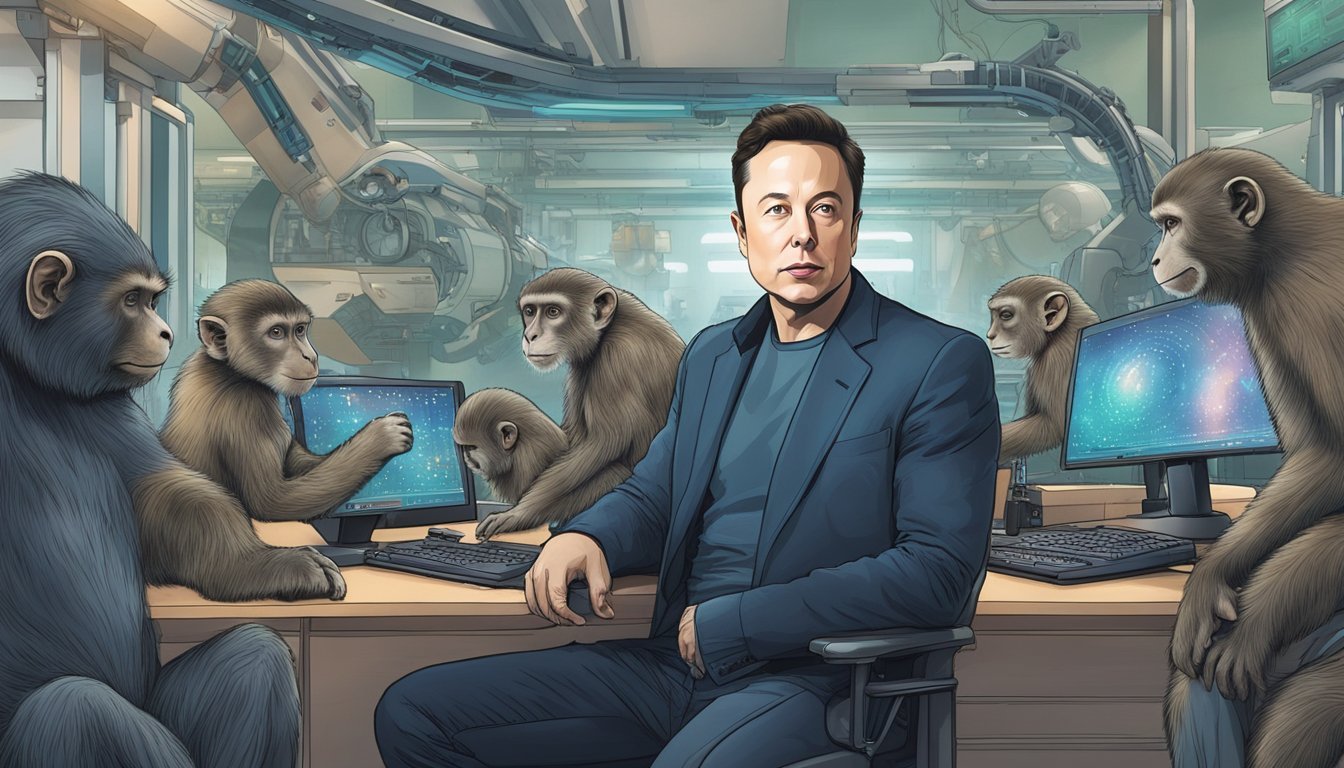Neuralink Monkeys: Controversy Erupts Over Animal Testing and Monkey Deaths!
Neuralink, Elon Musk's brain-computer interface company, has faced controversy over its animal testing practices. The company aims to develop implants that allow direct communication between the human brain and computers. Several monkeys involved in Neuralink's experiments have died, contradicting Musk's claims that no primates perished due to the implants.
Documents reveal that some macaques used in Neuralink trials experienced severe health issues before being euthanized. These problems included bloody diarrhea, partial paralysis, and cerebral edema. Animal rights groups have accused the company of subjecting the monkeys to extreme suffering and illegal mistreatment during the testing process.
The deaths of these primates have raised ethical concerns about Neuralink's research methods and transparency. While the company acknowledges that monkeys died as part of its testing procedures, it denies allegations of animal cruelty. This situation has sparked debate about the balance between scientific progress and animal welfare in the development of cutting-edge neural technologies.
Neuralink's Mission and Overview
Neuralink aims to develop advanced brain-computer interfaces to enhance human capabilities and address neurological conditions. The company focuses on creating implantable devices that can interact directly with the brain.
Foundational Goals and Objectives
Neuralink's primary goal is to create a seamless connection between the human brain and computers. The company envisions a future where individuals can control devices through thought alone. This technology could potentially restore sensory and motor function to those with neurological disorders.
Neuralink also aims to address complex brain conditions like Alzheimer's and Parkinson's disease. The company's brain implants are designed to record and stimulate neural activity, potentially offering new treatment options for these conditions.
Advancements in Brain-Computer Interfaces
Neuralink has developed a coin-sized chip called the "Link" that can be implanted in the brain. This device contains thousands of electrodes capable of detecting neural signals. The company has demonstrated the chip's functionality in animal trials, showing its ability to record brain activity and transmit data wirelessly.
Neuralink's technology uses machine learning algorithms to interpret neural signals and translate them into commands for external devices. This approach could enable individuals with paralysis to control computers or prosthetic limbs using their thoughts.
The company is working towards human trials, aiming to demonstrate the safety and efficacy of its brain-chip implants in clinical settings. Neuralink faces ongoing scrutiny regarding medical ethics and the long-term implications of brain-computer interfaces.
Elon Musk's Role and Vision
Elon Musk, the entrepreneur behind Tesla and SpaceX, founded Neuralink in 2016 with the ambitious goal of developing brain-chip implants. His vision centers on creating a direct interface between the human brain and computers.
Musk sees Neuralink as a way to enhance human cognition and potentially treat neurological conditions. He has been vocal about the potential for brain-chip implants to address issues like paralysis and memory loss.
The company's progress has been marked by both achievements and controversies. Musk has made bold claims about Neuralink's capabilities, including successful tests on monkeys.
In 2023, Neuralink received FDA approval to begin human clinical trials. This marked a significant milestone in Musk's quest to bring brain-computer interfaces to market.
Musk's leadership style at Neuralink mirrors his approach at other companies. He sets aggressive timelines and pushes for rapid development, sometimes leading to friction with regulatory bodies and animal rights groups.
Despite criticisms, Musk remains committed to his vision of merging human intelligence with artificial intelligence. He sees Neuralink as a crucial step in humanity's technological evolution.
The Use of Monkeys in Neuralink Research
Neuralink's use of monkeys in its research has sparked debate about animal welfare and scientific progress. Primate testing remains a crucial yet controversial aspect of developing brain-computer interface technology.
Ethical Considerations in Primate Testing
Neuralink's experiments on macaque monkeys have raised ethical concerns. Records show some primates died during testing procedures. Animal welfare advocates argue the research causes unnecessary suffering. Proponents claim it's essential for advancing medical treatments.
Behavioral training prepares monkeys for experiments. This process aims to reduce stress and improve data quality. Critics question if benefits outweigh potential harm to animals.
Transparency issues surround Neuralink's primate research. Limited public access to detailed records fuels skepticism about the company's practices.
Regulations and Oversight
The Animal Welfare Act governs the treatment of research animals in the U.S. This law sets standards for housing, handling, and veterinary care. Primate centers must follow strict protocols to ensure animal well-being.
Oversight bodies monitor compliance with regulations. Regular inspections aim to prevent mistreatment. Critics argue current regulations are insufficient to protect primates fully.
Neuralink's partnership with UC Davis ended in 2020. Questions remain about ongoing practices and adherence to animal welfare standards. Calls for increased transparency and stricter oversight continue.
Controversies and Ethical Debates
Neuralink's animal testing practices have sparked intense debate and scrutiny. The company faced allegations of animal cruelty and regulatory violations in its experiments with monkeys.
Internal staff disputed Elon Musk's claims that no monkeys died from Neuralink implants. Reports indicated unnecessary suffering and deaths among test subjects.
The Physicians Committee for Responsible Medicine raised concerns about Neuralink's treatment of animals. They highlighted potential violations of the US Animal Welfare Act.
FDA inspections uncovered "objectionable conditions" in Neuralink's facilities. This added to existing worries about the company's animal care practices.
Critics argue that Neuralink's lack of transparency endangers the entire field of neurotechnology. The company has been called upon to address ethical and social issues related to its work.
Animal rights advocates question the necessity and ethics of using primates in brain-computer interface research. They call for stricter oversight and alternatives to animal testing.
Neuralink's experiments at the California National Primate Research Center came under particular scrutiny. Public records requests revealed details about the treatment of animal subjects.
The controversy extends beyond animal welfare to broader ethical questions about brain-computer interfaces. Experts debate the long-term implications and potential risks of this technology.
Neuralink's Animal Study Protocols
Neuralink's animal testing practices have faced scrutiny regarding veterinary care, record keeping, and transparency. The company's protocols for handling test subjects, particularly Rhesus Macaques, have raised concerns among animal welfare advocates and regulators.
Veterinary Care and Oversight
Neuralink employs veterinary staff to monitor the health of test subjects. The Institutional Animal Care and Use Committee (IACUC) oversees animal welfare protocols. Rhesus Macaques used in experiments receive regular health checks.
Some monkeys have reportedly experienced complications from implant surgeries. These include infections and other health issues. In certain cases, antibiotic-resistant pathogens have been documented.
When animals develop severe conditions, euthanasia may be recommended. The decision to euthanize is based on veterinary assessments and ethical guidelines.
Record Keeping and Transparency
Neuralink maintains veterinary records for each test subject. These documents track health status, procedures performed, and any complications.
Necropsy reports are generated for deceased animals. These reports detail cause of death and any implant-related issues.
Critics argue that Neuralink has not been fully transparent about animal welfare incidents. Some information has only come to light through external investigations and regulatory inquiries.
The company has faced allegations of delayed reporting of adverse events. Improved record-keeping practices and public disclosure could address these concerns.
Scientific and Medical Outcomes
Neuralink's brain-computer interface experiments have yielded mixed scientific and medical results. The company aims to develop technology to treat neurological conditions like ALS and paralysis.
Brain implants tested in macaque monkeys produced some concerning outcomes. Veterinary records indicate several monkeys experienced adverse effects including chronic infections, paralysis, and brain swelling.
Cerebral edema was reported in some test subjects following implantation procedures. This brain swelling can lead to increased intracranial pressure and potential neurological damage.
The invasive nature of the experimental head implants carries inherent risks. Potential complications include infection, hemorrhage, and trauma to delicate neural tissue.
While Neuralink claims progress toward its goals, independent verification of positive outcomes remains limited. The company has not yet published peer-reviewed studies on its primate research.
As Neuralink moves toward human clinical trials, safety concerns persist. Thorough evaluation of risks versus potential benefits for conditions like depression will be crucial.
Transparency regarding both positive and negative results from animal studies is essential. This data informs the scientific community and regulatory bodies as brain-computer interface technology advances.
Legal and Regulatory Compliance
Neuralink faces ongoing scrutiny from regulatory bodies regarding its animal testing practices. The US Food and Drug Administration (FDA) identified "objectionable conditions" at Neuralink's California animal testing facilities in June 2023.
This inspection occurred shortly after the FDA approved Neuralink for a small human trial. The findings raised concerns about the company's adherence to ethical and regulatory standards for animal experimentation.
Elon Musk's previous claims that no monkeys died from Neuralink implants have been disputed by internal staff. Reports suggest some animals experienced unnecessary suffering and deaths during experiments.
The company must address these issues to maintain compliance with federal regulations. Failure to do so could impact Neuralink's ability to conduct further research or advance to human trials.
Animal welfare organizations have also voiced concerns about Neuralink's practices. These groups advocate for stricter oversight and more humane alternatives to animal testing in neurotechnology development.
As Neuralink progresses with its brain-computer interface technology, it will likely face increased regulatory scrutiny. The company must demonstrate improved compliance to maintain its experimental head implant research program.
Impact on Future Human Healthcare
Neuralink's brain-computer interface technology has significant potential to transform healthcare. The device could enable paralyzed individuals to control devices and communicate more easily.
For those with neurological conditions, it may restore lost functions or alleviate symptoms. The technology could potentially treat conditions like epilepsy, Parkinson's disease, and depression.
Brain-computer interfaces may allow direct monitoring of brain activity to detect health issues early. This could lead to more personalized and effective treatments for various neurological and psychiatric disorders.
However, the technology raises important ethical considerations. Issues of privacy, consent, and potential misuse must be carefully addressed as clinical trials progress.
Long-term effects on brain function and structure remain unknown. Rigorous testing and oversight will be crucial to ensure patient safety as the technology advances.
If successful, Neuralink's implants could dramatically improve quality of life for many patients. But balancing innovation with appropriate safeguards will be an ongoing challenge for researchers and regulators.
Human Healthcare: • Potential benefits: Restored motor control, symptom relief • Possible applications: Paralysis, epilepsy, Parkinson's, depression • Key concerns: Privacy, consent, long-term effects • Next steps: Continued clinical trials and safety testing
Discussion of Potential Neurotechnologies
Brain-computer interfaces (BCIs) represent a frontier in neurotechnology. These devices aim to establish direct communication pathways between the brain and external devices.
Neuralink, founded by Elon Musk, is developing a BCI system involving tiny electrodes implanted in the brain. The company's goal is to enable control of computers and mobile devices through thought alone.
Other potential applications of BCIs include restoring movement in paralyzed individuals and treating neurological conditions. Some researchers are exploring their use for enhancing cognitive abilities or memory.
Ethical considerations surround these technologies. Questions arise about data privacy, potential misuse, and long-term effects on brain function.
Safety remains a primary concern. Animal trials, including those conducted by Neuralink on monkeys, have faced scrutiny over welfare issues and mortality rates.
Human trials of BCIs are progressing cautiously. Several companies and research institutions are working on various approaches, from invasive implants to non-invasive external devices.
The development of these technologies involves complex challenges. These include achieving long-term stability of implants, improving signal processing, and ensuring biocompatibility.
Advancements in materials science and miniaturization are crucial for creating less invasive and more effective BCIs. Future devices may be smaller, wireless, and capable of interfacing with larger brain areas.









